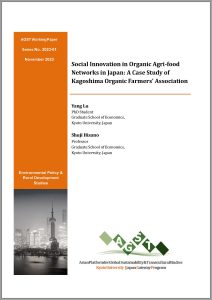No.2023-01
November 2023
Social Innovation in Organic Agri-food Networks in Japan: A Case Study of Kagoshima Organic Farmers’ Association
Number
No.2023-01
Month of Issue
November 2023
Title
Social Innovation in Organic Agri-food Networks in Japan: A Case Study of Kagoshima Organic Farmers’ Association
Author(s)
Yang Lu
Shuji Hisano
Affiliation(s)
Graduate School of Economics, Kyoto University
Keywords
Social Innovation, Organic Agri-food Networks, Transformation, Social Innovation Ecosystem, Scaling Strategies
Abstract
A multitude of social innovations (SI) that likely bring up transformation and their corresponding SI ecosystem has been formed and sustained because of organic agri-food networks' efforts in civil society across Japan. In order to transform the current agri-food system, the organic agri-food networks apply several scaling strategies to enhance their influence at the macro level. Against this backdrop, this article aims to examine and analyze 1) the organic agri-food SI-centered ecosystem involving economic and socio-political environments alongside primary actors, 2) the process of the implementation of scaling strategies (i.e., scaling out, scaling up, and scaling deep), and specifically the facilitations or constraints that determine the potential of SI to the transforming agri-food system during the implementation of these strategies. This study employs the case study method and qualitative research methods to investigate the Kagoshima Organic Farmers Association (KOFA). As a result of the study, KOFA’s SI ecosystem consists of a gradually favorable socio-political environment at national and prefectural levels alongside a commercializing economic environment, and five groups of actors (i.e., organic farmer members, partners and retailers, governmental bodies, public-private-partnership (PPP) organizations and NGOs/NPOs and others). Among all implementing actors of scaling strategies, the leaders within KOFA, governmental bodies and officials in PPP organizations are the key actors in constraining or facilitating the potential of KOFA for transforming the current organic agri-food system. Furthermore, the authors argue that policymakers and academia should pay more attention to the process and outcomes of SI implementation of "scaling deep" strategies and the changing needs and mindsets of relevant actors because it is an effective way to promote organic agriculture to more actors to encounter organic agriculture in a more direct, equal and diverse manner.




